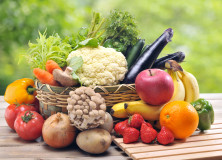Organic Food vs. Conventional Food: What Happens To The Human Body When You Switch To Organic.

Organic farming is good for the environment, but does it make a difference to the human body? The Swedish Environmental Research Institute IVL studied a family of five who didn’t eat organic foods to find out what chemicals still lingered in their bodies. Researchers took urine samples from each member of the family, including the mother, father, two daughters, and a toddler-aged son to measure these chemicals.
“We found insecticides, fungicides, and plant growth regulators,” said the study’s co-author Jorgen Magner, from the Swedish Environmental Research Institute, in the video. “We know very little about the long-term effects of eating food treated with pesticides, especially if you consider the chemicals can be much more harmful when combined together than they are on their own.”
Researchers went into their home, replacing all of the food, from inside their cabinets to their fridge, and put them on an organic-only diet for two weeks. They took a second round of urine samples in order to see the effects of the diet within each of the family members’ bodies. They found both the occurrence and the number of pesticides had decreased dramatically — in fact, almost all of the chemicals had disappeared.
“When you hear this, you think about your children,” the mother involved in the study said. “There were a whole number of chemicals removed from my kids’ bodies and I don’t want them back.”
Understanding Organic
The family had been living on what most humans eat today — conventionally grown food. The only difference between conventional and organic food is how it’s grown. Conventional food is grown with fertilizers and pesticides that are prohibited from organically farmed produce, according to the European Food Information Council. The current agriculture system relies heavily on chemical pesticides, however, convenience comes at a price. Health consequences, such as elevated risk for certain forms of cancer, Parkinson’s disease, autism, neurological defects, reproductive problems, and respiratory diseases, often result from short- and long-term consumption.
Farmers who grow organic produce without chemical pesticides and fertilizers have to raise and treat food differently than conventional farmers in order to avoid pests and weeds. Because of this, it takes longer to plant, grow, and harvest the products. Currently, eight in 10 households buy at least some certified organic products, most of which are produce and dairy. However, as demand for organic food and products increase, technological innovations will reduce cost of production, processing, and distribution, according to the Food and Agriculture Organization of the United Nations.
Fonte: http://www.medicaldaily.com


